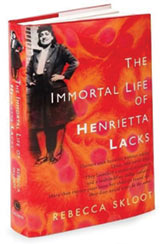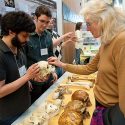Go Big Read gets a fast start on campus; author to visit on Oct. 25
Go Big Read, UW–Madison’s common reading program, is off to a vigorous start. Some 5,000 copies of “The Immortal Life of Henrietta Lacks,” by Rebecca Skloot, were given away in September at the Chancellor’s Convocation for New Students.

Rebecca Skloot, author of “The Immortal Life of Henrietta Lacks,” will give a talk at 7 p.m. on Monday, Oct. 25, at the Kohl Center. The event is free and open to the public. No tickets are needed.
The book is also being used in 53 courses this semester, from Afro-American studies and history to plant pathology and sociology.
And, the campus and community are anticipating Skloot’s appearance on Monday, Oct. 25 at the Kohl Center where she will discuss the book, the issues it raises and her journey in writing it in “An Evening With Rebecca Skloot.” Doors open at 6 p.m., with the program starting at 7 p.m. No tickets are required.
The book tells the story of Henrietta Lacks, the forgotten woman behind one of the most important tools in modern medicine, and of Lacks’ descendants, many of whom feel betrayed by the scientific establishment. Skloot’s book has been lauded by Amazon as one of the 10 best books of the year so far, and by National Public Radio as one of the top five best of the bestsellers.
The book has also proven valuable in classrooms across the campus.
George Johnson teaches one of the 53 courses using the book: Engineering Professional Development 155. The students in the class are freshmen and are considering careers in engineering or science.
They are covering a wide swath of topics, including the historical setting of the book, the characteristics of dedicated researchers, the Nuremberg Code, the Tuskegee syphilis experiment, ethics of biological research and UW–Madison’s human subjects protocols. “I hope my students can see that tissue research is very complicated and that there is tension between consent and scientific progress. By studying the historical arc they can see the dilemmas of research,” says Johnson.
““There is lots of excitement about the book. There is so much in it: culture, race, health disparities, doing science, research and ethics.””
Jeanine Mount, associate dean of Academic Affairs at the School of Pharmacy
Johnson also says his students have written in class assignments they are glad they are using the book and most agree it is “a good read.”
For students in the health sciences, the issues raised in “The Immortal Life Of Henrietta Lacks” are very real and will influence their daily work as health care professionals and researchers. Discussing those issues will help give some perspective to what they could struggle with every day, such as ownership of bodily parts and tissue, the inclusion and necessary protection of human subjects, the place of the HeLa cell in research, the ethics of informed consent, and the question of racial equity in research protocols.
To discuss those weighty issues and get students to examine their personal feelings and beliefs, faculty, staff and students from the four health sciences schools (the schools of Medicine and Public Health, Pharmacy, Veterinary Medicine, and Nursing) and the Ebling Library are holding 47 discussion sessions in the three weeks leading up to Skloot’s Oct. 25 visit and campus talk.
Making those discussions happen is a group of valiant instructors and administrators, the Interprofessional Health Education Committee (IHEC). They hope to connect with and bring together some 800 health sciences students in one-hour facilitated sessions. Participants will discuss themes such as science and society, race and culture, and ethics in research. Students will consider, as future health professionals, what messages and attitudes they will take from Skloot’s book.
“There is lots of excitement about the book,” says Jeanine Mount, associate dean of Academic Affairs at the School of Pharmacy. “There is so much in it: culture, race, health disparities, doing science, research and ethics.” As a sociologist and pharmacist, Mount says she knew about the importance of the HeLa cell line and the science behind its development, but never knew the back story, or about Lacks.
In addition to the direct issues raised in the discussion sections, students in the health professions will receive additional value by talking about those issues with students from other disciplines. The IHEC discussions are setup to be cross-disciplinary, giving the participants a wide exposure to experiences and health disciplines.
Mount says the university has offered interprofessional courses in the past, but these large-scale discussion sections with Go Big Read are different. “Students need to learn with and from each other. They will be working as part of a health care team when they graduate and interprofessional learning is essential to health care. The IHEC discussions are helping to stimulate those connections. This is a national issue being faced at other universities,” says Mount. “They need to learn what other professions bring to the team. Ultimately, this will better meet patients’ needs.”
“This book has such a broad span. It covers everything from genomics to big societal issues,” says Mount. “It catalyzes all our efforts to add interprofessional learning. This is not a generic book club; it is a rich educational experience for our students.”
Tags: bioethics, biosciences, books, events, humanities, learning


